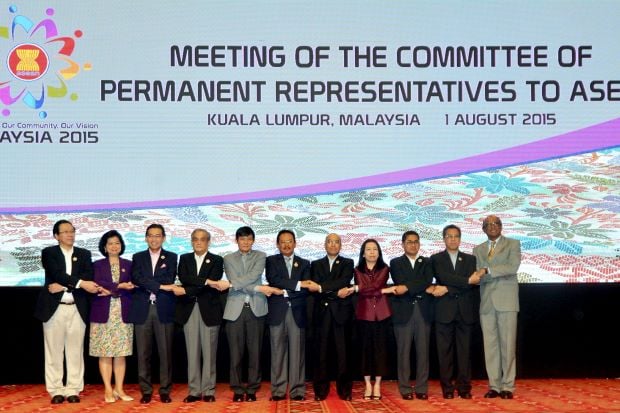
Representatives of ASEAN countries gather at Putra World Trade Centre on Saturday. RAJA FAISAL HISHAN/The Star.
“It should not be discussed,” remarked Chinese Vice Foreign Minister Liu Zhenmin on Monday, referring to the South China Sea dispute prior to Tuesday’s meeting in Kuala Lumpur of the Association of Southeast Asian Nations (ASEAN). China claims close to 90 percent of the South China Sea, amid rival claims by Vietnam, the Philippines, Malaysia, Taiwan and Brunei, many of which overlap.
Liu, in an interview with Reuters, warned non-ASEAN countries, such as the U.S., not to interfere. “This is not the right forum. This is a forum for promoting cooperation. If the U.S. raises the issue we shall of course object. We hope they will not.” Other non-ASEAN participants in this week’s meeting include China, India, Japan, South Korea, Australia, Russia and the European Union.
Chinese foreign minister Wang Yi also argued on Monday that the upcoming ASEAN meeting is not “the appropriate place for discussing specific bilateral disputes” and noted that discussion would “heighten confrontation.”
The most vocal of nations criticizing China’s actions in the South China Sea is the Philippines, which recently took Beijing to the Permanent Court of Arbitration in The Hague for a ruling over its right to waters in a 200-nautical mile “exclusive economic zone” off its coast. The U.S. has also been critical of Beijing’s actions, calling for a halt to the construction of artificial islands and an airstrip on Fiery Cross Reef. Last week, the Center for Strategic and International Studies (CSIS) speculated Beijing is building another artificial island for military purposes.
While the U.S. is officially neutral in the dispute, arguing for freedom of navigation to protect the $5 trillion in shipping trade that passes through the region each year, the U.S. military has become increasingly active in the region, stepping up military drills with regional allies such as the Philippines and Japan. The Obama administration will send Secretary of State John Kerry as its representative to Kuala Lumpur on Wednesday, who will likely press for a halt to island reclamation and a demilitarization in the South China Sea, regardless of any attempt by Beijing to stifle discussion.
Indeed, the dictatorial attempt by Liu to halt discussion is almost laughable in diplomatic circles. It is counter to Beijing’s policy of non-interference in other countries affairs and inherently unenforceable. Furthermore, Wang’s similar attempt to stifle discussion of the South China Sea at the ASEAN meeting by suggesting the forum is not “the appropriate place for discussing specific bilateral disputes,” purposely fails to take into account that some of these disputes are multilateral. Many disputes are multilateral and overlapping.
Beijing, of course, prefers to approach the dispute on a bilateral basis, using potentially lucrative trade deals as an economic carrot and its vast military clout as a stick. This carrot and stick approach has been used to stifle discussion during other ASEAN meetings held in Laos and Cambodia, but this time around in Kuala Lumpur may prove more difficult, given heightened island reclaiming activity by China in the Spratley Island chain, increased military activity by Beijing, budding anger among other South Sea claimants, and (given the slow pace and inability to enforce any decision reached by the Permanent Court of Arbitration in The Hague) the lack of an alternative multilateral platform for resolving the issues.